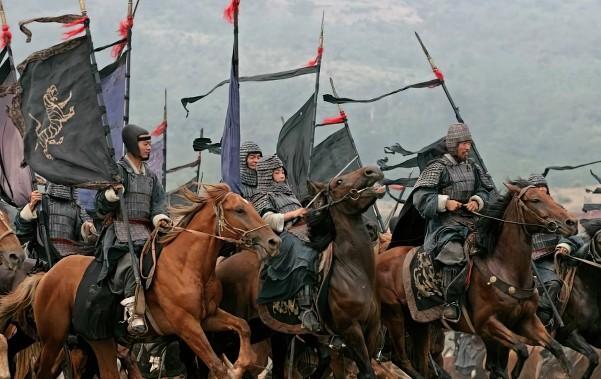Li Yu, the empress dowager of the Southern Tang Dynasty, was a famous lyricist, but he failed to become emperor and became the king of the Southern Tang Dynasty. However, Li Yu's grandfather was a very powerful figure, he was born poor, his parents died since childhood, and he was once a homeless orphan, but he was able to seize the opportunity to get ahead, realize the counterattack of life, and eventually become the founding prince of the Southern Tang Dynasty. So, what kind of character was Li Yu's grandfather?
Li Yu's grandfather was named Li Fu (biàn), nicknamed Peng Nu, and was a native of Xuzhou. In the last year of the Tang Dynasty, the world was in chaos, and Li Fu's father Li Rong disappeared from the war, and since then Li Fu has been orphaned and wandered around Haozhou and Sizhou. In 895, Huainan Jiedu had Yang Xing secretly attack Haozhou, and he found that the seven-year-old Li Fu was very good-looking and liked him very much, so he wanted to adopt him as an adopted son. However, Yang Xingmi's sons did not accept Li Fu.

Therefore, Yang Xingmi handed Over Li Fu to the Ministry to adopt Xu Wen. Xu Wen also liked Li Fu very much and named him Xu Zhihuan. When Li Fu grew up, "seven feet long, broad and long, gentle and strategic", he was appointed as an envoy of the Lou Ship Army, leading the water army to garrison Jinling, and later for his military achievements, he served as the assassin of Shengzhou. At that time, many of the local officials were military generals, and "the service was to be guarded by war", but Li Fu was diligent and studious, diligent and thrifty, and "took leniency as the government, and the people were slightly praised."
At this time, the world had entered the Period of the Five Dynasties and Ten Kingdoms, and after Yang Xingmi's death, Xu Wen became a powerful vassal of the State of Wu. Xu Wen personally went to Shengzhou to inspect and found that "the treasury was full and the walls were repaired", so he moved his station to Shengzhou. Although Li Fu was very dissatisfied, he had no choice but to go to Runzhou to take office. At that time, Xu Wen left his eldest son Xu Zhixun in Guangling to preside over the imperial government, while he himself was stationed in other places and remotely controlled the imperial court.
In 918, the city of Guangling changed, Xu Zhixun was killed, and the power of the DPRK and China was empty. Upon hearing the news, Li Fu immediately led his army to Guangling to quell the rebellion, and then seized the opportunity to control the government. During Li Fu's reign, in order to gain the support of the people, he "lenient the criminal law, pushed the letter of grace, and raised the Yanbin Pavilion to treat the people of the four directions", and repeatedly helped the people, so "although Wen Yao adhered to the great government, the Wu people were quite returned to the top", and Li Fu was only thirty years old that year.
In 927, Li Fu said on the table that "the auxiliary government has been long, please return to the old Jinling", in fact, he adopted the practice of Xu Wen in that year, leaving the town of Jinling himself, and letting his son Li Jingtong serve as a Situ and Tongping Zhangshi, "knowing the chinese and foreign left and right military forces, staying in Jiangdu to assist the government". One day in 933, Li Fu, who was already 45 years old, found that his beard was white, and sighed to his attendant Zhou Zong: "The work has been accomplished, and I am old, why not?" ”
Emperor Zhou understood Li Fu's thoughts and hurried to Guangling to meet Song Qiqiu, "Mou Zen Dynasty". However, Song Qiqiu objected and demanded that Zhou Zong be beheaded, but Li Fu did not agree, but only demoted Zhou Zong. But at this point, everyone knew Li Fu's thoughts. In 936, "all the countries of Fujian and Yue sent envoys to persuade them to advance", and Li Fu believed that he was "expected to return", so he began to plan the matter of becoming emperor. In 937, Li Fu was proclaimed emperor by Zen and changed the name of the country to Daqi.
Two years later, Li Fu officially restored the Li surname and changed his name to Fu, and at the same time he posthumously recognized his ancestor as the Tang Dynasty Patriarch, and changed the name of the country to Tang, known as Southern Tang. Li Fu was born in a humble background and was well aware of the sufferings of the people, so during his reign, he did not use troops abroad, but adopted a policy of lightly dispensing with thin endowments, recuperating and recuperating, and promoting the recovery and development of Jiangnan's economy. In 943, Li Fu fell ill and died at the age of fifty-six, and was known as the ancestor of the Southern Tang Dynasty.
References: 1. History of the New Five Dynasties, 2. Zizhi Tongjian